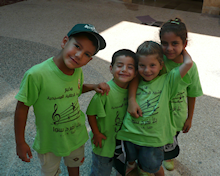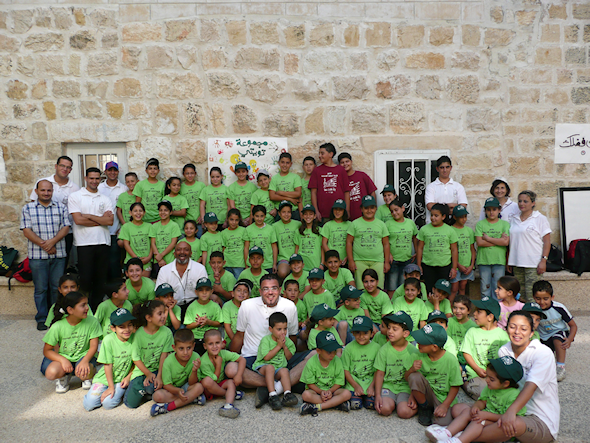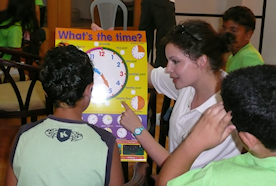Jifna Summer Camp
Kathryn Lland, some of whose other activities for the Trust are recorded elsewhere on this site (English Lessons and Running for the Trust) wrote the following article for the November, 2009, issue of The Vine, the Northampton Diocesan Newsletter, about the four weeks she spent in Palestine in July, 2009, teaching English in the Jifna Summer Camp. We are grateful to the Diocese and to the Vine’s editor for their permission to reproduce the text and images from the article here:
“The experience was one that can only be described as life changing and extremely thought provoking and, as anyone who has been to the Holy Land will tell you, one trip to the Middle East and you will never watch the news in the same light again!

Children at the Camp
Jifna is a small, mainly Christian village 14 miles north of Jerusalem. The annual Summer Camp runs the whole month of July and is organised for all the children in the village aged between 4 and 18 years old, 180 children in total! The Camp is supported by a dedicated team of local volunteers, university students, local seminarians and primary school teachers, who work tirelessly to give these children a summer to remember. From 8:30am to 2pm children between 4 and 12 years old are able to take part in activities including arts and crafts, music, sport, aerobics, religion and swimming lessons at the local swimming pool. From 4pm to 10pm it is the turn of the teenagers – 13 to 18.
As well as providing plenty of fun, the summer camp serves to heal children from the trauma they have experienced as a result of the ongoing Palestinian/Israeli conflict, whilst building their self esteem and improving their communication skills. The leisure activities also serve to promote social integration and community cohesion, elements which are vitally important if we want to maintain a Christian community in the Holy Land.

Staff and Students at the Camp
Christians currently make up less than 2% of the population of the Holy Land. During the Pope’s recent visit, he appealed to Christians to stay in the Holy Land, a feat proving ever more difficult as Christians in Palestine endure ongoing difficulties.

Telling the time in English
My time volunteering in the camp was an educational and cultural one, for both the children and myself. Almost none of the children had ever met an English person before, and many of them jumped at the chance to practise their spoken English and in particular to improve their pronunciation. When I asked them why they felt it was so important to learn English, many said that if they spoke English, they could get a better job when they finished school and would be able to support their family. Their enthusiasm and dedication was infectious and I was only too happy to help. With the use of books, posters, maps, flash cards and activity sheets brought over from the UK, I was able to introduce the children to a different approach to learning a foreign language. We even managed to make it fun!
My first experience of the Palestinian people found them to be kind, generous and very family orientated. It was heart warming to see them coming together to support others in the face of such adversity. I was also touched by the fact that Palestinian children are extremely grateful for the education they receive, something which many of us take for granted in this country. The children are a true inspiration as they realise the best way to change their circumstances is by furthering their education and not through violent measures.”